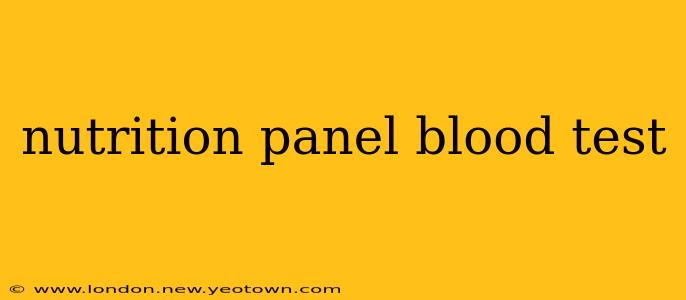Have you ever stared at a blood test report, feeling utterly bewildered by the array of numbers and abbreviations? It's a common experience. Today, we're going to unravel the mysteries of the nutrition panel blood test, explaining what it reveals about your body's nutritional status and what those results actually mean. Imagine it as a detailed snapshot of your inner workings, highlighting potential deficiencies or excesses. Let's embark on this journey together.
My name is Dr. Anya Sharma, and I've spent over a decade helping patients understand their health through comprehensive blood work analysis. I've seen firsthand the power of understanding these results to make informed decisions about nutrition and overall wellness.
What is a Nutrition Panel Blood Test?
A nutrition panel blood test isn't a single, standardized test. Instead, it's a collection of tests that provide insights into various aspects of your nutritional health. It typically measures levels of essential vitamins, minerals, and other nutrients in your blood. These tests look beyond the basics and dive into the specifics of your nutritional intake and how your body is processing these vital components. This panel allows your healthcare provider to identify potential deficiencies or excesses before they lead to significant health problems. Think of it as your body's personal nutrition report card.
What Nutrients are Typically Included in a Nutrition Panel?
The specific nutrients included in a nutrition panel can vary depending on your individual needs and your doctor's recommendations. However, many common panels include tests for:
- Vitamin D: Crucial for bone health, immune function, and mood regulation.
- Vitamin B12: Essential for nerve function, red blood cell production, and DNA synthesis.
- Iron: Vital for carrying oxygen throughout the body and preventing anemia.
- Folic Acid: Necessary for cell growth and development, particularly important during pregnancy.
- Complete Blood Count (CBC): While not strictly a nutritional marker, it provides information about your red blood cells, white blood cells, and platelets, which can indirectly reflect nutritional status.
What do low levels of vitamins and minerals mean?
Finding out you have low levels of certain vitamins and minerals can be concerning, but it's important to remember that it doesn't automatically mean you're seriously ill. Often, it simply indicates a need for dietary adjustments or supplementation. Low levels of vitamins and minerals can lead to a variety of health problems, depending on the nutrient in question. For example, iron deficiency can lead to anemia, resulting in fatigue and weakness. Vitamin D deficiency is linked to weakened bones and an increased risk of fractures.
How do I interpret low levels of certain vitamins and minerals?
It's absolutely crucial to discuss your results with your doctor or a registered dietitian. They can help interpret the results in the context of your overall health, lifestyle, and medical history. Self-diagnosing and treating nutrient deficiencies can be dangerous, so professional guidance is essential.
What if my levels are high?
High levels of certain nutrients can also be problematic. For example, excessively high iron levels (hemochromatosis) can damage organs over time. Similarly, very high levels of some vitamins can be toxic. Again, consulting with a healthcare professional is essential to understand the implications of elevated nutrient levels.
What are the potential risks of having high levels of vitamins and minerals?
The risks associated with high levels depend on the specific nutrient and the extent of the elevation. Your doctor can explain the specific risks to you and recommend appropriate management strategies.
What are the causes of nutritional deficiencies?
Nutritional deficiencies can stem from a variety of factors, including:
- Poor diet: Not consuming enough of nutrient-rich foods.
- Malabsorption: Conditions that prevent the body from properly absorbing nutrients from food.
- Medical conditions: Certain illnesses can interfere with nutrient metabolism.
- Medications: Some medications can affect nutrient absorption or utilization.
- Lifestyle factors: Excessive alcohol consumption, smoking, and lack of sunlight exposure.
How can I prevent nutritional deficiencies?
Maintaining a balanced diet rich in fruits, vegetables, whole grains, and lean protein is the best way to prevent most nutritional deficiencies. Regular exercise, adequate sleep, and managing stress levels also play crucial roles in supporting overall health and nutrient absorption.
What should I do after receiving my nutrition panel results?
After receiving your nutrition panel results, schedule a follow-up appointment with your doctor or a registered dietitian to discuss the findings. They can help you create a personalized plan to address any deficiencies or excesses. This plan might involve dietary changes, supplementation, or further testing. Remember, your blood test provides a valuable snapshot, but it's only one piece of the puzzle in understanding your overall health.
By understanding your nutrition panel blood test, you empower yourself to take proactive steps toward optimal health. Remember, this information is for educational purposes only and should not be considered medical advice. Always consult with a healthcare professional before making any decisions about your health or treatment.

